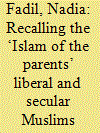| Srl | Item |
| 1 |
ID:
149002


|
|
|
|
|
| Summary/Abstract |
Public key cryptosystems are secure only when the authenticity of the public key is assured. Shao proposed
a new scheme to overcome the problems of the existing schemes, which suffers from two major drawbacks. The
first drawback is the availability of users’ passwords in plaintext format in key server which are prone to attacks
by ill-minded users. The second one is depending on the key server blindly for certificate generation, without
further verification by the user. To overcome these severe drawbacks, we proposed an improved key authentication
scheme based on Chinese remainder theorem and discrete logarithms. Our scheme allows the user to generate his/
her certificate without the help of any trusted third party. This scheme is intended for online services, military and
defense applications to exchange keys securely.
|
|
|
|
|
|
|
|
|
|
|
|
|
|
|
|
| 2 |
ID:
151747


|
|
|
|
|
| Summary/Abstract |
Scholarship on Islam in Europe has largely invested in examining the generational dynamics in the lived religious experiences of Muslims. Within this perspective, the idea of a generation gap, which revolves around a distinction between ‘tradition’ and ‘religion’, has figured as an important account in assessing some of these religious transformations. Drawing on fieldwork with Belgian Muslims of Moroccan origin, this paper seeks to nuance this perspective by exploring accounts wherein this ‘traditional’ Islam of the parents is actively reclaimed. This was especially the case for respondents who were quite critical of Islamic revivalist trends. In many of these stories, the parents’ Islam was understood as tolerant and open, in a way that was consonant with ‘tradition’. By focusing on these narratives, a first aim of the paper is to understand how genealogy and ancestry figure as distinct criteria in determining the ‘real Islam’. A second aim is to complicate the understanding of the liberal and modern self, and its relationship to the past.
|
|
|
|
|
|
|
|
|
|
|
|
|
|
|
|